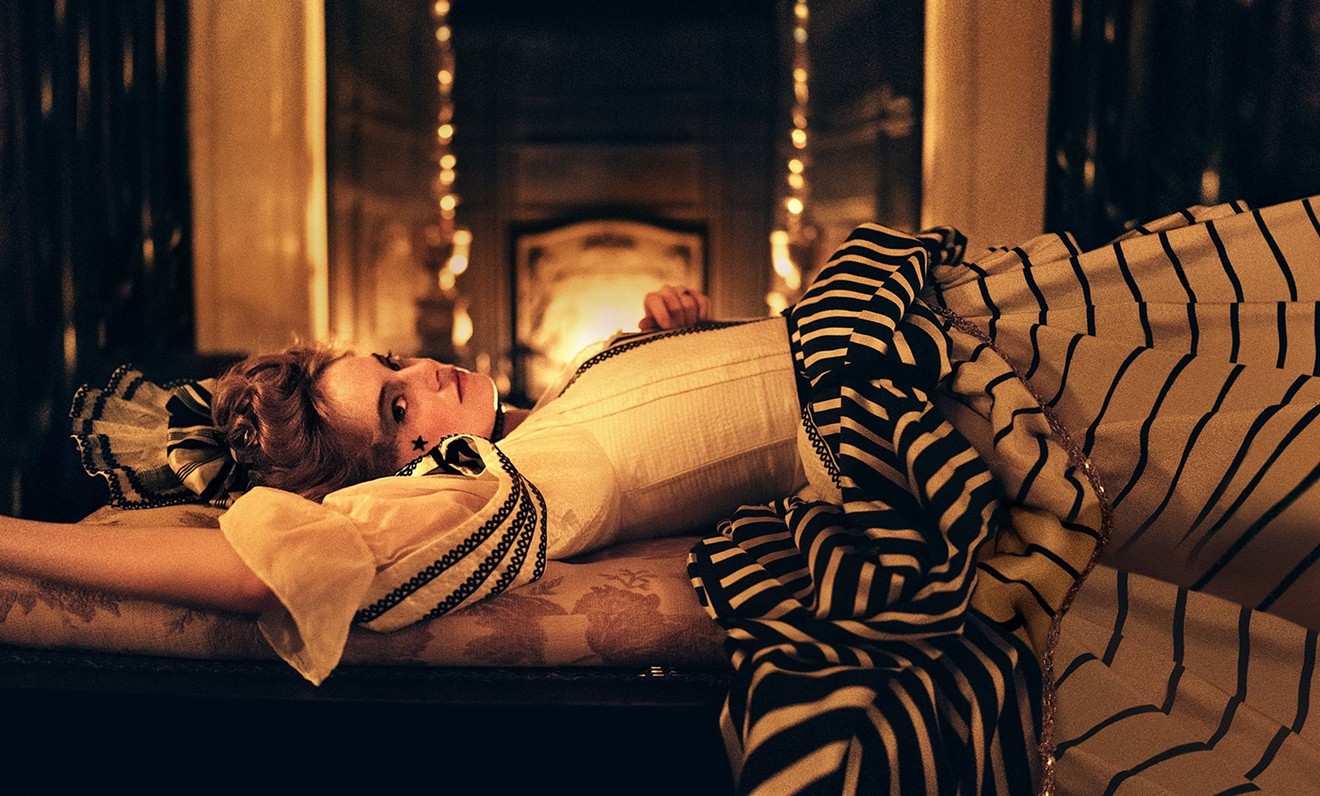Any concern that an elegantly mounted, star-studded period piece set during the War of Spanish Succession might have diluted Greek surrealist Yorgos Lanthimos’ particular brand of sadism turns out to be entirely unwarranted. That becomes clear just moments in, as soon as Academy Award winner Emma Stone falls out of a horse-drawn carriage and into a giant, wet pile of shit. Face first. If anything, The Favourite takes to scabrous new levels the Dogtooth and The Lobster director’s fascination with the absurdity of social mores and the thin line between power and humiliation.
Stone plays the impoverished, fallen-from-grace Abigail, the daughter of a one-time nobleman who lost her in a card game. She has arrived at the court of Britain’s Queen Anne (Olivia Colman), seeking help from Lady Sarah Churchill (Rachel Weisz), the monarch’s close friend and personal adviser and, as it so happens, a distant relative of Abigail’s. Don’t expect any family warmth, however. The cool, calculating, judgmental Sarah regards Abigail with a mixture of bemusement and disgust. Nevertheless, she still carries some fond feelings for the girl’s father, so Abigail gets a job as a servant, and a bath.
The young arrival, however, turns out to be a quick study, finding that she can navigate the palace’s seemingly genteel world of obsequiousness, self-abasement and manipulation as well as anyone. Sarah’s relationship with the Queen extends also to intimate matters, and Abigail begins to discover the power of sex in matters of state — and how she herself can wield it.
Sarah may recognize Abigail as a threat, but there appears to be little she can do about it. The new arrival, motivated by desperation, ambition and a kind of merciless joy, is too good at insinuating herself into power. And the Queen is deeply conflicted and lost: It’s the early 18th century, there’s a war on with France, and the persistently ill, somewhat childish Anne struggles both to assert her authority and to preserve her kingdom and her crown.
The men around them, including the Earl of Oxford (Nicholas Hoult), are dim, preening cocks of the walk whose political machinations are no match for the personal intrigues and strategic savagery of Sarah and Abigail as they struggle for the Queen’s favor. Indeed, in this world where women seem to hold all the power, the men are mostly interested in hedonism and degradation. They’re also way more made up than the women: In this movie, it’s the dudes who lumber around in high heels, ornate outfits and hilariously huge wigs; the ladies, by contrast, look gracefully modest.
Stylistically, Lanthimos continues and builds on the expressionistic imagery of The Killing of a Sacred Deer. His angles are low, his lenses wide and his camera constantly in motion, tracking and whip-panning. In Sacred Deer, such elements added a kind of mythic grandeur to the proceedings, as if the judgment of the gods were ever-present, looming over the characters and their bizarre roundelay of guilt and revenge. But they imbue The Favourite, with a certain delirious unpredictability, a sense that the standard-issue costume drama, usually so stately and regal, has been opened up and turned inside out. (There’s also a dance sequence, mixing the modern and the classical, that manages to be both hilariously bizarre and beautiful.)
But amid all this Lanthimosian weirdness, the film breathes, too. The screenplay is the first of his major works that the director hasn’t at least cowritten; it’s credited to Deborah Davis and Tony McNamara, and apparently it has been bouncing around for two decades. Maybe that provenance accounts for the urgency of the performances, though Lanthimos has been building to that in his work. In the past, the director preferred an arch, declarative acting style, which worked perfectly well with his absurdist, symbolic storylines. Sacred Deer began to show cracks in that facade, however, letting in bits of emotion and despair and (gasp) humanity. And The Favourite’s trio of lead actresses dig into their parts with gusto. This is a movie filled with profanity and anguish and illness and bodily fluids, and more than any previous picture by this director, its world feels lived in, its stakes important. For once, the horrors don’t seem quite so arbitrary. Beneath all their conniving and backstabbing, these women act like they deeply need this proximity to power — that it’s the one thing keeping them from ignominy and destruction. And, as the film eventually demonstrates, with painful hilarity, they’re not wrong.
[
{
"name": "Air - MediumRectangle - Inline Content - Mobile Display Size",
"component": "18855504",
"insertPoint": "2",
"requiredCountToDisplay": "2"
},{
"name": "Editor Picks",
"component": "17105533",
"insertPoint": "4",
"requiredCountToDisplay": "1"
},{
"name": "Inline Links",
"component": "18349797",
"insertPoint": "8th",
"startingPoint": 8,
"requiredCountToDisplay": "7",
"maxInsertions": 25
},{
"name": "Air - MediumRectangle - Combo - Inline Content",
"component": "17105532",
"insertPoint": "8th",
"startingPoint": 8,
"requiredCountToDisplay": "7",
"maxInsertions": 25
},{
"name": "Inline Links",
"component": "18349797",
"insertPoint": "8th",
"startingPoint": 12,
"requiredCountToDisplay": "11",
"maxInsertions": 25
},{
"name": "Air - Leaderboard Tower - Combo - Inline Content",
"component": "17105535",
"insertPoint": "8th",
"startingPoint": 12,
"requiredCountToDisplay": "11",
"maxInsertions": 25
}
]











